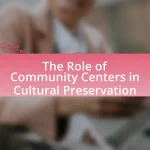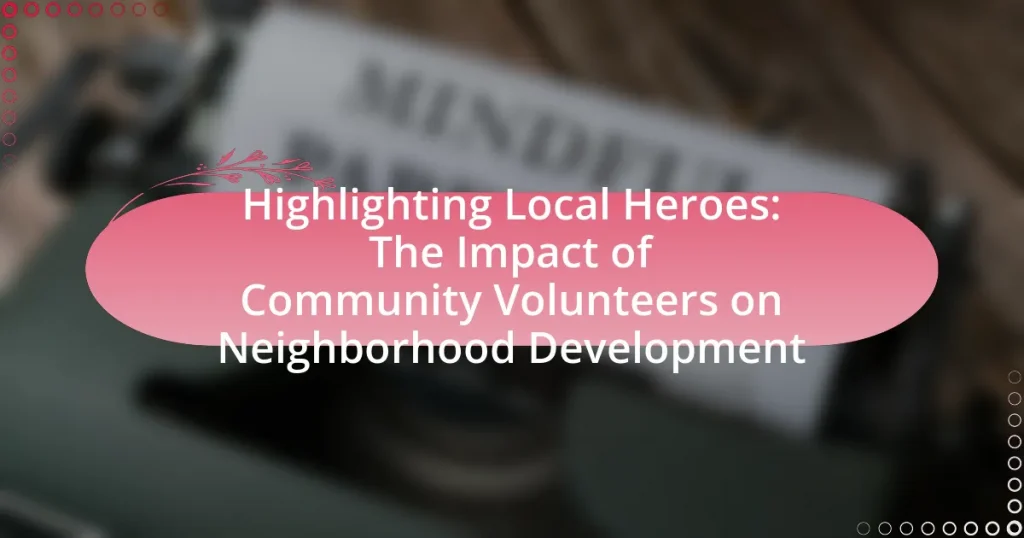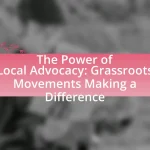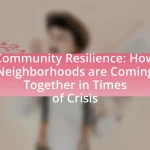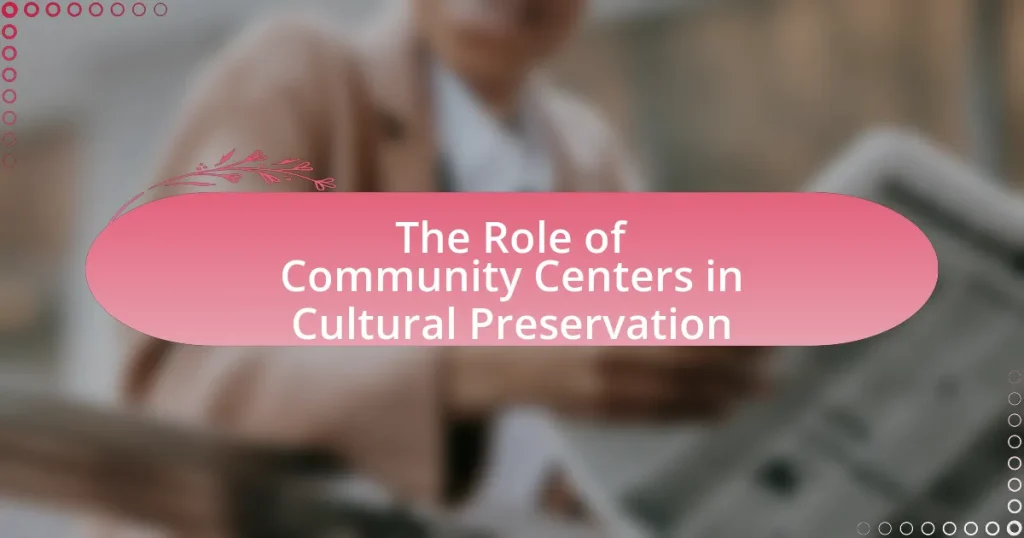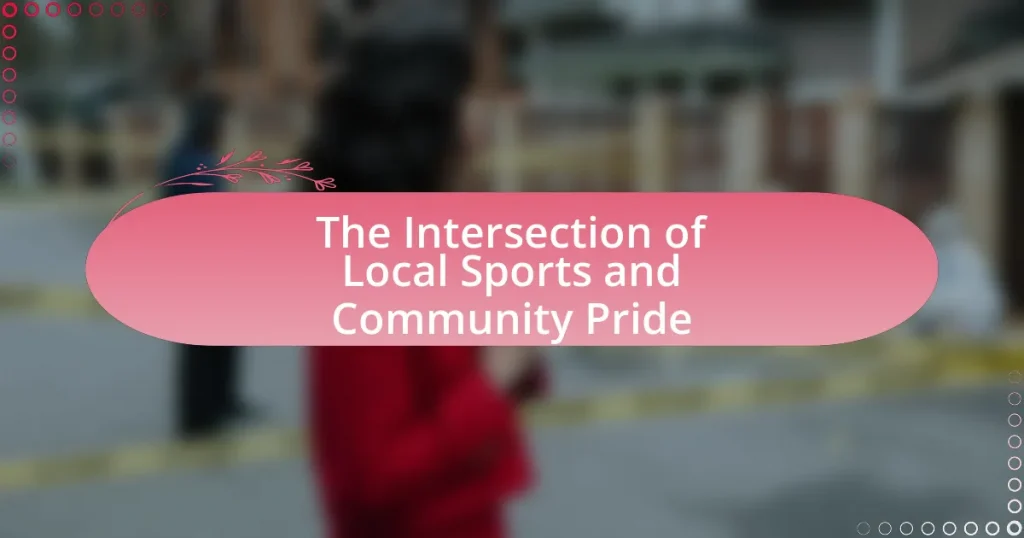Community volunteers play a crucial role in neighborhood development by dedicating their time and skills to enhance local well-being. Their contributions include organizing events, providing educational programs, and addressing issues such as safety and health, which foster social cohesion and improve quality of life. Research shows that active volunteer programs lead to increased civic engagement, lower crime rates, and significant economic contributions, with volunteers generating an estimated $184 billion annually in the U.S. economy. The article explores the various ways volunteers impact local initiatives, the challenges they face, and best practices for enhancing their effectiveness in community development.
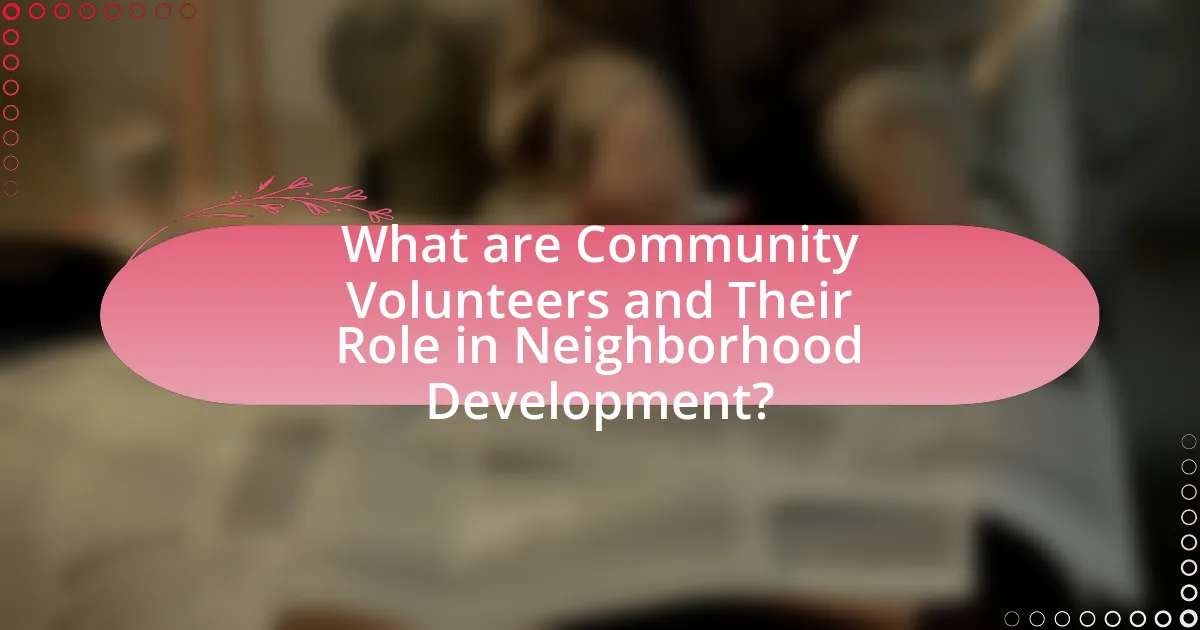
What are Community Volunteers and Their Role in Neighborhood Development?
Community volunteers are individuals who dedicate their time and skills to support initiatives that enhance the well-being of their neighborhoods. Their role in neighborhood development includes organizing community events, providing educational programs, and addressing local issues such as safety, health, and environmental concerns. Research indicates that neighborhoods with active volunteer programs experience increased social cohesion and improved quality of life, as volunteers foster connections among residents and mobilize resources for community projects. For instance, a study by the Corporation for National and Community Service found that communities with higher volunteer rates report greater civic engagement and lower crime rates, demonstrating the tangible impact of community volunteers on neighborhood development.
How do community volunteers contribute to local initiatives?
Community volunteers significantly enhance local initiatives by providing essential manpower, resources, and expertise. They engage in various activities such as organizing events, cleaning public spaces, and supporting local charities, which directly benefits the community. For instance, a study by the Corporation for National and Community Service found that volunteers contribute an estimated $184 billion annually to the U.S. economy through their unpaid work, demonstrating their substantial impact on local development. Additionally, volunteers foster social cohesion by building relationships among residents, which strengthens community ties and encourages further participation in local initiatives.
What types of projects do community volunteers typically engage in?
Community volunteers typically engage in projects such as environmental clean-ups, food drives, educational tutoring, and community gardening. These projects aim to address local needs and improve the quality of life in neighborhoods. For instance, environmental clean-ups help reduce pollution and enhance public spaces, while food drives provide essential resources to families in need. Educational tutoring supports academic achievement among youth, and community gardening fosters sustainable practices and community bonding. Each of these project types contributes significantly to neighborhood development and social cohesion.
How do volunteers collaborate with local organizations?
Volunteers collaborate with local organizations by engaging in various activities that support community initiatives. This collaboration often includes organizing events, providing manpower for projects, and sharing resources or expertise. For instance, a study by the Corporation for National and Community Service found that volunteers contribute approximately 7.9 billion hours of service annually, which significantly enhances the capacity of local organizations to address community needs. Through these collaborative efforts, volunteers help to strengthen community ties and promote sustainable development within neighborhoods.
Why are community volunteers considered local heroes?
Community volunteers are considered local heroes because they selflessly dedicate their time and efforts to improve the well-being of their neighborhoods. Their contributions often address critical needs such as food security, education, and health services, which directly enhance the quality of life for residents. For instance, a study by the Corporation for National and Community Service found that volunteers contribute an estimated $184 billion annually to the U.S. economy through their unpaid work, demonstrating their significant impact on community development. This commitment to service fosters social cohesion and inspires others to engage, further amplifying their role as heroes within the community.
What personal qualities make volunteers stand out in their communities?
Volunteers stand out in their communities due to qualities such as empathy, commitment, and leadership. Empathy allows volunteers to connect with the needs of others, fostering a supportive environment. Commitment drives them to consistently engage in community activities, demonstrating reliability and dedication. Leadership enables volunteers to inspire and mobilize others, creating a ripple effect of positive change. Research indicates that communities with active volunteers experience enhanced social cohesion and improved local services, highlighting the significant impact of these personal qualities on neighborhood development.
How do volunteers inspire others to participate in community service?
Volunteers inspire others to participate in community service by demonstrating the positive impact of their actions and fostering a sense of community engagement. Their visible commitment and dedication often motivate individuals to join in, as they see firsthand the benefits of collective efforts in addressing local issues. Research indicates that peer influence plays a significant role in volunteerism; for instance, a study published in the Journal of Community Psychology found that individuals are more likely to volunteer when they observe their friends or family members doing so. This social proof creates a ripple effect, encouraging broader participation in community initiatives.
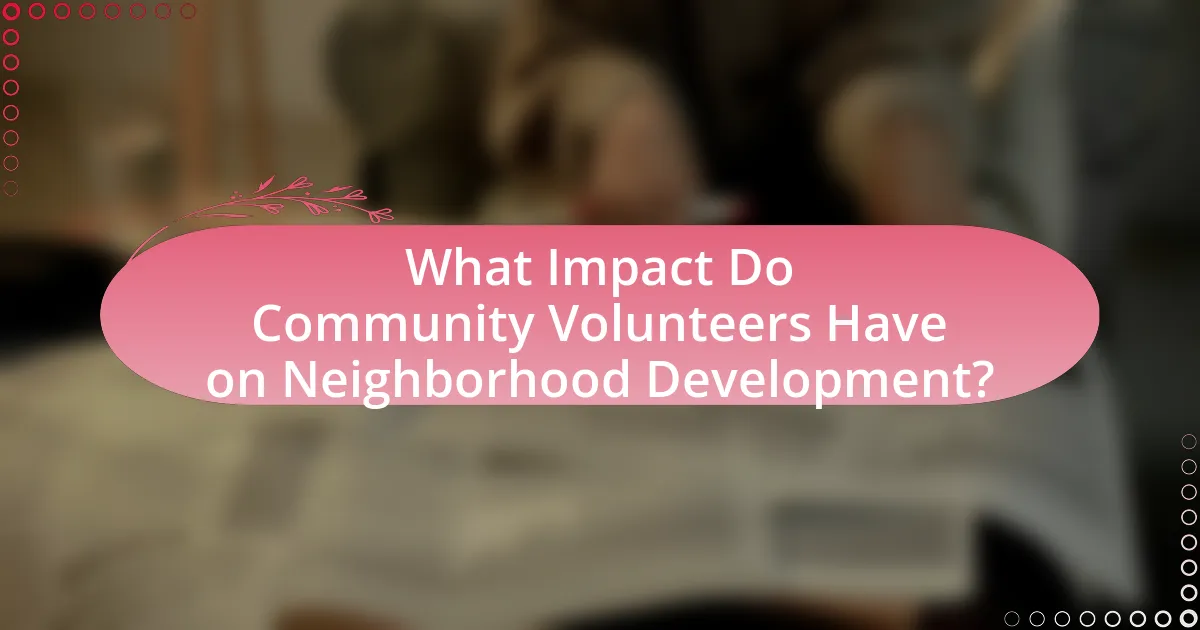
What Impact Do Community Volunteers Have on Neighborhood Development?
Community volunteers significantly enhance neighborhood development by fostering social cohesion, improving local infrastructure, and addressing community needs. Their involvement leads to increased civic engagement, which strengthens community ties and encourages collaboration among residents. For instance, a study by the Corporation for National and Community Service found that neighborhoods with active volunteer programs experience a 20% increase in community satisfaction and a 15% decrease in crime rates. Additionally, volunteers often participate in projects such as park clean-ups, community gardens, and educational programs, which directly improve the quality of life and promote sustainable development within the neighborhood.
How do volunteers influence social cohesion in neighborhoods?
Volunteers significantly enhance social cohesion in neighborhoods by fostering connections among residents and promoting a sense of belonging. Their active participation in community projects, such as organizing events or providing support to local initiatives, encourages interaction and collaboration among diverse groups. Research indicates that neighborhoods with higher volunteer engagement report stronger social ties and increased trust among residents, which are critical components of social cohesion. For instance, a study published in the Journal of Community Psychology found that communities with robust volunteer networks experienced a 30% increase in perceived social support and community involvement, demonstrating the tangible impact of volunteerism on neighborhood unity.
What role do volunteers play in fostering community relationships?
Volunteers play a crucial role in fostering community relationships by bridging gaps between diverse groups and enhancing social cohesion. Their active participation in local initiatives, such as community clean-ups, food drives, and educational programs, creates opportunities for interaction and collaboration among residents. Research indicates that communities with high volunteer engagement experience increased trust and cooperation among members, leading to stronger social networks. For instance, a study by the Corporation for National and Community Service found that volunteering can lead to a 20% increase in community engagement and a 30% improvement in social ties, demonstrating the significant impact volunteers have on building and maintaining community relationships.
How does volunteer work enhance community identity?
Volunteer work enhances community identity by fostering a sense of belonging and shared purpose among residents. When individuals engage in volunteer activities, they contribute to local initiatives that reflect the community’s values and needs, thereby strengthening social ties. Research indicates that communities with active volunteer programs experience increased civic engagement and collaboration, which further solidifies their identity. For instance, a study by the Corporation for National and Community Service found that communities with higher volunteer rates report greater social cohesion and a stronger sense of community identity.
What economic benefits arise from community volunteer efforts?
Community volunteer efforts generate significant economic benefits by enhancing local economies, reducing public service costs, and fostering social cohesion. These volunteers contribute labor that can save municipalities and organizations substantial amounts of money; for instance, the Independent Sector estimates the value of volunteer time at approximately $28.54 per hour in 2021. This contribution can lead to improved community services, such as parks and recreational facilities, which in turn can attract businesses and tourism. Additionally, volunteer initiatives often stimulate local spending as volunteers engage with local businesses during their activities, further boosting the economy. Research from the Corporation for National and Community Service indicates that communities with higher volunteer rates experience lower crime rates and improved public health, which can lead to reduced costs for social services and healthcare.
How do volunteers contribute to local economic growth?
Volunteers contribute to local economic growth by enhancing community services and fostering social cohesion, which in turn attracts businesses and investments. Their efforts in organizing events, supporting local nonprofits, and improving public spaces create a more vibrant community, making it appealing for new businesses to establish themselves. For instance, a study by the Corporation for National and Community Service found that volunteering can lead to increased local economic activity, with volunteers generating an estimated $184 billion in economic value annually through their contributions. This economic impact is further amplified as local businesses benefit from increased foot traffic and community engagement driven by volunteer-led initiatives.
What are the long-term financial impacts of volunteer-led projects?
Volunteer-led projects can lead to significant long-term financial impacts by reducing operational costs for organizations and fostering community engagement that drives local economic growth. These projects often rely on the free labor of volunteers, which can save organizations substantial amounts in staffing expenses; for example, a study by the Corporation for National and Community Service found that volunteer service contributed an estimated $184 billion to the U.S. economy in 2018. Additionally, volunteer-led initiatives can enhance local infrastructure and services, attracting further investment and stimulating local businesses. This creates a cycle of economic benefit, as improved community resources can lead to increased property values and local tax revenues, ultimately strengthening the financial stability of neighborhoods.
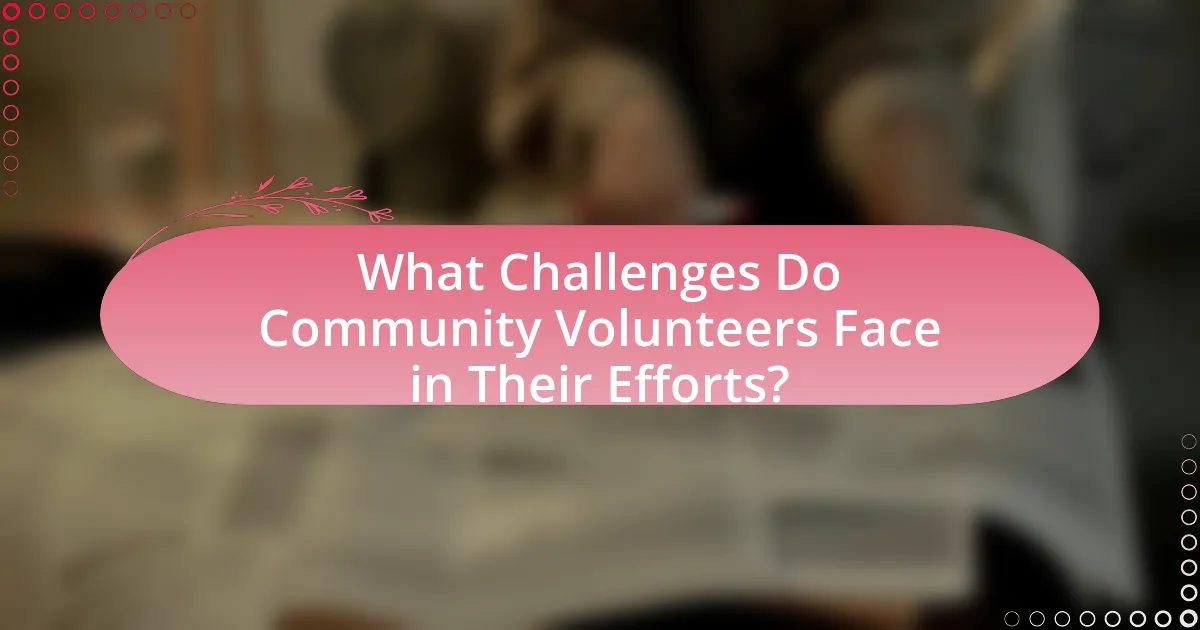
What Challenges Do Community Volunteers Face in Their Efforts?
Community volunteers face several challenges in their efforts, including limited resources, lack of recognition, and coordination difficulties. Limited resources, such as funding and supplies, hinder the ability of volunteers to effectively implement projects. A study by the National Council of Nonprofits indicates that 70% of nonprofits report funding as a significant barrier to volunteer engagement. Lack of recognition can demotivate volunteers, as many feel their contributions go unnoticed, impacting their willingness to continue. Additionally, coordination difficulties arise from managing diverse groups of volunteers, which can lead to miscommunication and inefficiencies. These challenges collectively affect the overall impact of community volunteers on neighborhood development.
What obstacles hinder the effectiveness of community volunteers?
Obstacles that hinder the effectiveness of community volunteers include lack of resources, insufficient training, and poor communication. These factors can significantly limit the ability of volunteers to contribute meaningfully to community projects. For instance, a study by the National Volunteer Center found that 60% of volunteers reported feeling unprepared due to inadequate training, which directly affects their confidence and effectiveness in executing tasks. Additionally, limited access to necessary materials or funding can prevent volunteers from implementing their initiatives successfully, as highlighted in research by the Corporation for National and Community Service, which noted that resource constraints are a common barrier faced by volunteer organizations. Lastly, ineffective communication among team members can lead to misunderstandings and decreased collaboration, further diminishing the impact of volunteer efforts.
How can volunteers overcome resource limitations?
Volunteers can overcome resource limitations by leveraging community partnerships and utilizing creative problem-solving strategies. By collaborating with local businesses, non-profits, and government agencies, volunteers can access additional resources such as funding, materials, and expertise. For instance, a study by the Corporation for National and Community Service found that community engagement can significantly enhance resource availability, enabling volunteers to implement projects that would otherwise be unfeasible. Additionally, volunteers can employ innovative approaches, such as crowdsourcing or skill-sharing, to maximize the impact of limited resources, demonstrating that effective collaboration and creativity can lead to successful outcomes in community development.
What strategies can be employed to address volunteer burnout?
To address volunteer burnout, organizations can implement strategies such as regular check-ins, providing training and resources, and recognizing volunteer contributions. Regular check-ins help identify signs of burnout early, allowing for timely support and adjustments to workloads. Providing training equips volunteers with the skills needed to perform their tasks efficiently, reducing frustration and stress. Recognizing contributions through awards or public acknowledgment fosters a sense of value and belonging, which can mitigate feelings of burnout. Research indicates that organizations that actively engage in these practices see a decrease in volunteer turnover and an increase in overall satisfaction among volunteers.
How can communities better support their volunteers?
Communities can better support their volunteers by providing adequate training, resources, and recognition for their contributions. Training equips volunteers with the necessary skills to perform their roles effectively, which enhances their confidence and impact. Resources, such as access to materials and funding, enable volunteers to execute their projects successfully. Recognition, through awards or public acknowledgment, fosters a sense of appreciation and motivates volunteers to continue their efforts. Research indicates that communities with structured support systems for volunteers see higher retention rates and increased volunteer satisfaction, ultimately leading to more significant neighborhood development outcomes.
What resources are essential for empowering community volunteers?
Essential resources for empowering community volunteers include training programs, access to funding, and effective communication tools. Training programs equip volunteers with necessary skills and knowledge, enhancing their effectiveness in community initiatives. Access to funding allows volunteers to implement projects and sustain their efforts, as evidenced by studies showing that well-funded volunteer programs achieve greater impact. Effective communication tools facilitate collaboration and information sharing among volunteers, which is crucial for organizing and executing community projects successfully.
How can local governments facilitate volunteer initiatives?
Local governments can facilitate volunteer initiatives by providing resources, support, and recognition for volunteers. They can establish volunteer programs that connect community members with local needs, such as organizing events or creating platforms for volunteer opportunities. For instance, cities like San Francisco have implemented volunteer coordination offices that streamline the process for residents to engage in community service, resulting in increased participation rates. Additionally, local governments can offer training and workshops to equip volunteers with necessary skills, enhancing their effectiveness and satisfaction. Recognition programs, such as awards or public acknowledgments, can further motivate individuals to participate, as seen in various municipalities that celebrate volunteer contributions during community events.
What Best Practices Can Enhance Volunteer Impact in Neighborhood Development?
Best practices that can enhance volunteer impact in neighborhood development include establishing clear goals, providing training, fostering community partnerships, and recognizing volunteer contributions. Clear goals ensure that volunteers understand their roles and the desired outcomes, which increases effectiveness. Training equips volunteers with necessary skills, enhancing their ability to contribute meaningfully. Community partnerships leverage local resources and expertise, creating a more integrated approach to development. Recognizing volunteer contributions boosts morale and encourages ongoing participation, as evidenced by studies showing that acknowledgment increases volunteer retention rates.
